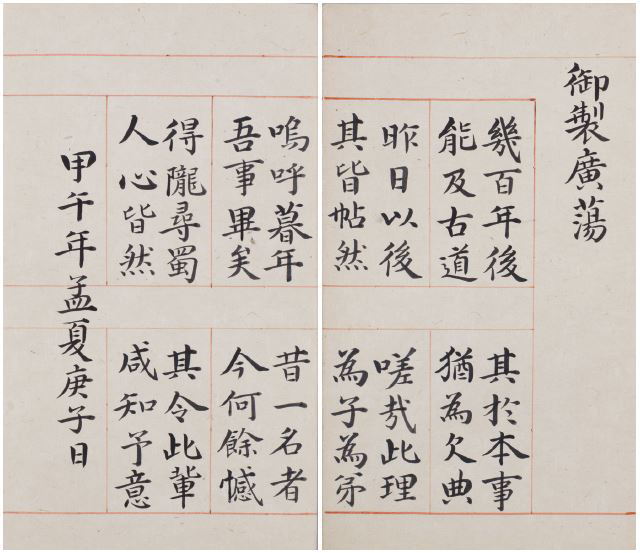"(Translation) 御製廣蕩"의 두 판 사이의 차이
(→Primary Sources: Veritable Records of the Joseon Dynasty) |
|||
| 54번째 줄: | 54번째 줄: | ||
| − | ==='''Student 1 : Dohee Jeong, Jinsook You, | + | ==='''Student 1 : Dohee Jeong, Jinsook You, Soyun Lee, Martin Gehlmann'''=== |
---- | ---- | ||
Translation: | Translation: | ||
2017년 7월 16일 (일) 10:11 판
| Primary Source | ||
|---|---|---|
 |
Title | |
| English | ||
| Chinese | 御製廣蕩 | |
| Korean(RR) | 어제광탕(Eoje gwangtang) | |
| Text Details | ||
| Genre | Royal Documents | |
| Type | ||
| Author(s) | King Yeongjo | |
| Year | 1774 | |
| Source | ||
| Key Concepts | King Yeongjo, | |
| Translation Info | ||
| Translator(s) | Participants of 2017 Summer Hanmun Workshop (Advanced Translation Group) | |
| Editor(s) | ||
| Year | 2017 | |
목차
- 1 Introduction
- 2 Original Script
- 3 Translation
- 3.1 Student 1 : Dohee Jeong, Jinsook You, Soyun Lee, Martin Gehlmann
- 3.2 Student 2 : (Write your name)
- 3.3 Student 3 : (Write your name)
- 3.4 Student 4 : (Write your name)
- 3.5 Student 5 : (Write your name)
- 3.6 Student 6 : (Write your name)
- 3.7 Student 7 : (Write your name)
- 3.8 Student 8 : (Write your name)
- 3.9 Student 9 : (Write your name)
- 3.10 Student 10 : (Write your name)
- 3.11 Student 11 : (Jinsook You)
- 3.12 Student 12 : (Write your name)
- 3.13 Student 13 : (Write your name)
- 3.14 Student 14 : (Write your name)
- 4 Secondary Sources
- 5 Further Readings
Introduction
Coming Soon!!
Primary Sources: Veritable Records of the Joseon Dynasty
上曰: "嫡室無子有妾子, 而以他人子爲後, 渠輩當冤之矣。 文武旣通淸, 何獨不爲承嫡乎? 嫡妾俱無子云者, 是欺君也。"
Original Script
| Classical Chinese | English |
|---|---|
|
御製廣蕩 幾百年後 能及古道 其於本事 猶爲欠典 |
(translation) |
Translation
Student 1 : Dohee Jeong, Jinsook You, Soyun Lee, Martin Gehlmann
Translation:
御製廣蕩 Royal writing on Spreading Harmony
幾百年後 能及古道 After a few hundred years, we may be able to attain the ways of antiquity
其於本事 猶爲欠典 Regarding this (the present) matter, yet the king's grace bestowed was lacking
昨日以後 其皆帖然 Since yesterday, all matters have come to a peaceful state #1
嗟哉此理 爲子爲弟 Ah! This principle is designed for sons and brothers
嗚呼暮年 吾事畢矣 Alas, in my twilight years, my enterprises have just been concluded
昔一名者 今何餘憾 Those who in the past were sons of concubines, today what grievances can they harbor?
得隴尋蜀 人心皆然 Gaining the Land of Long, one pursues the Land of Shu#2, human nature is just like this
其令此輩 咸知予意 With this order these people will know my intent
甲午年孟夏庚子日 On the 18th Day of the 4th month in the kabo year (1774).
1. On the day before, the 17th Day of the 4th Month in the kabo year (1774) Yeongjo decreed that secondary sons could take over the family succession if the primary descent line was interrupted, See http://sillok.history.go.kr/id/kua_15004017_001
2. A quotation from the Book of Later Han about Emperor Guangwu of Han who captured Gansu (隴) only to covet Sichuan (蜀). It metaphorically refers to the insatiable greed of human beings.
- Discussion Questions:
Student 2 : (Write your name)
- Discussion Questions:
Student 3 : (Write your name)
- Discussion Questions:
Student 4 : (Write your name)
- Discussion Questions:
Student 5 : (Write your name)
- Discussion Questions:
Student 6 : (Write your name)
- Discussion Questions:
Student 7 : (Write your name)
- Discussion Questions:
Student 8 : (Write your name)
- Discussion Questions:
Student 9 : (Write your name)
- Discussion Questions:
Student 10 : (Write your name)
- Discussion Questions:
Student 11 : (Jinsook You)
御製廣蕩 Royal Writing on Removing Discrimination in Family Succession
幾百年後 能及古道 How many centuries have been passed before the old way is reached? 昨日以後 其皆帖然 Since yesterday, everything has been straightened out. 其於本事 猶爲欠典 The only thing that worries me is any possible flaw the policy might have. 嗟哉此理 爲子爲弟 Ah! This principle is designed for sons and younger brothers. 嗚呼暮年 吾事畢矣 Oh! In my late years, my enterprises are completed. 昔一名者 今何餘憾 Unlike as in the past, sons of concubines do not need to harbor leftover grievance today. 得隴尋蜀 人心皆然 Endless greed is the human nature. 其令此輩 咸知予意 With the decree, they will all know my intention. 甲午年孟夏庚子日 April 18, 1774
- Discussion Questions:
Student 12 : (Write your name)
- Discussion Questions:
御製廣蕩 Royal Writing on Great Harmony 幾百年後 能及古道 After hundreds of years have passed, the Old Way could be reached. 昨日以後 其皆帖然 (편안하다 첩) Since yesterday, all matters have come to a peaceful state. 其於本事 猶爲欠典(은전恩典나라에서 내리는 혜택(惠澤)에 관하나 특전(特典) 이 부족하다 결전) Regarding this matter, only the king's grace bestowed is lacking. 嗟哉此理(광탕) 爲子爲弟 Ah! This principle is designed for sons and brothers. 嗚呼暮年 吾事畢矣 Oh! In my twilight years, my enterprises have just been completed. 昔一名者 今何餘憾 In the past, [you were ]"일명자", Now, how could you have any remaining grievances to harbor.
Student 13 : (Write your name)
- Discussion Questions:
Student 14 : (Write your name)
- Discussion Questions:
Secondary Sources
Deuchler, Martina: "Heaven Does Not Discriminate": A Study of Secondary Sons in Chosŏn Korea, in: The Journal of Korean Studies, Vol. 6 (1988-1989), pp. 121-163 https://www.jstor.org/stable/41490199?seq=1#page_scan_tab_contents
Kim Haboush, Jahyun: Filial Emotions and Filial Values: Changing Patterns in The Discourse of Filiality in Late Chosŏn Korea, in: Harvard Journal of Asiatic Studies, Vol. 55, No. 1 (Jun., 1995), pp. 129-177 http://www.jstor.org/stable/2719422?seq=1#page_scan_tab_contents




